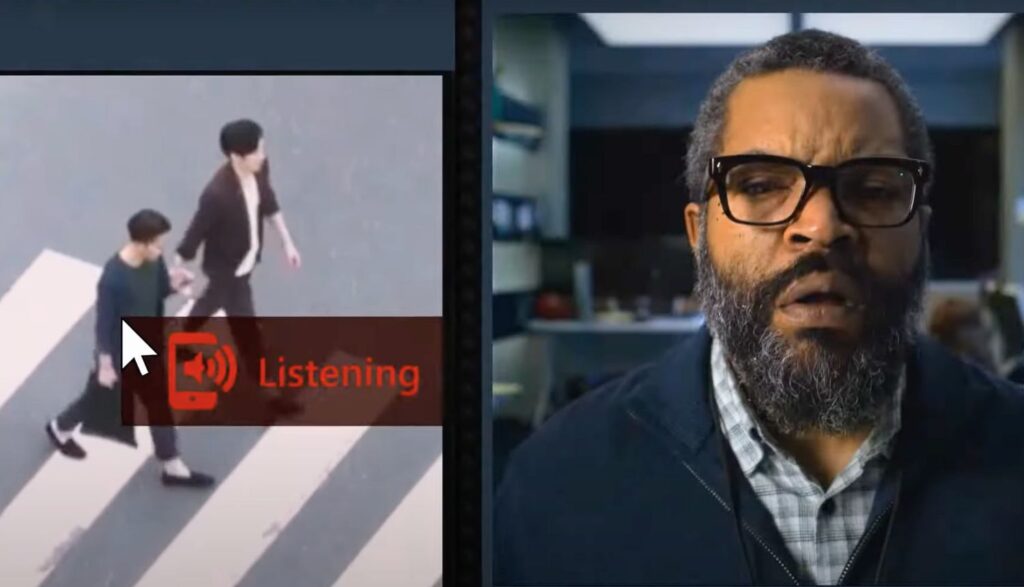
Yes, this iteration of War of the Worlds is less graphic than the 2005 remake starring Tom Cruise, even if its plot is not nearly as compelling. Though we see violence and death, it’s mostly implied instead of shown. Still, the swearing gets out of hand.
It’s William Radford’s job to know—literally.
He’s a top official for the Department of Homeland Security, and he spends his days stooped over his computer, flipping through security cameras, listening in on phone calls and scanning the Internet for anyone who might threaten the security of the United States.
His latest target is an anonymous hacker known as Disruptor. He’s been peddling conspiracy theories online about “Goliath,” a supposed secret government program meant to use the public’s personal data against them. Disruptor is threatening to expose confidential government documents to prove such a program exists, and it’s Will’s job to stop him.
That’s until a far bigger disruptor falls from the sky in the form of a meteor storm that smashes through satellites and scatters falling rocks all around the world.
Then those rocks break open. Robotic alien ships arise from the ground and begin blasting.
The Homeland Security building goes into lockdown. Will’s stuck inside, unable to help his son and daughter find safety from the invasion. He’s trapped, watching the invasion occur through security cameras and uploaded video clips.
But he’s got the country’s data at his fingertips. And even if he can’t go outside and help, he’ll still do everything he can to help from his desktop.
Will apologizes to his children for the mistakes he’s made as a parent. He also uses the information at his disposal to guide his daughter to safety and to protect her (as well as formulate a plan of attack against the invaders). Some risk their lives to stop the alien advance, and countries put aside their differences to form a global military resistance.
The film ultimately warns against government overreach in data collection. It suggests that trading freedom for government-sanctioned security often comes back to harm the citizens that the government intended to protect.
Someone uses the biblical phrase, “The truth will set you free,” an allusion to John 8:32.
We briefly see a marble statue of a naked man, sculpted into the artwork of a building.
A woman’s leg is impaled by a metal rod, which is really the only onscreen blood we see. Later, we also glimpse some blood stains and a blood trail left behind as she limped to safety.
Still, many others die, blasted by the aliens’ heat rays. Will watches as one person’s FaceTime connection goes dead, suggesting that’s what’s happened to him, too. Others die in explosions (likewise evidenced by their sudden lost connection). Still other victims perish when their helicopters, planes and commercial airliners crash and explode.
Background audio tells us that a meteor landed on a school, killing the children and teachers inside. All told, the death toll likely mounts up into the millions or more, even if we don’t directly witness most of those deaths.
We hear one use of the f-word and roughly 40 instances of the s-word. We also hear “a–,” “h—” and “d–n” used profusely, as well as two uses of “b–ch” and “b–tard.” God’s name is taken in vain about 30 times, including six instances with “d–n.” Jesus’ name is likewise misused five times.
None.
One character is a delivery driver for Amazon, and the promotional content throughout the film for that company starts to feel excessive. (Speedy delivery of an important package becomes a central plot point.)
Will uses his surveillance skills to track others to micromanage their lives.
If you were wondering why the entirety of War of the Worlds takes place on a desktop screen, the best answer is because it was shot during COVID lockdown. And, let me tell you, it turns out that watching someone react to an alien invasion through social media clips just isn’t quite as interesting as seeing Tom Cruise fight through it.
The style of film has been done before to some success: both Searching and Missing utilized the “desktop recording” medium to great effect; War of the Worlds does not. Instead, it merely makes the action feel distant. It’s paired with over-the-top commentary reactions from Ice Cube as he witnesses the events. These can sometimes sound like lines straight out of Mystery Science Theater 3000—though it’s evident they weren’t meant to be comedic.
Granted, in terms of content, this iteration of War of the Worlds is far less violent than its 2005 counterpart. And, for the most part, some of the film review’s content sections above are about as scarce as a town 20 seconds after the aliens visit it. However, the crude language concerns certainly pick up the slack, being by far the biggest issue parents will need to consider here.
War of the Worlds is an unintentionally goofy reimagining of H.G. Wells’ infamous alien invasion set in the modern age, utilizing our modern technology to warn audiences about data collection. Perhaps the most confusing part of the film is that the aliens were entirely unnecessary to tell such a story; there are far better ways of critiquing government overreach into the public’s personal information than summoning heat-ray wielding aliens.
But if you’d like an unintentional laugh, War of the Worlds might just do it—if you’re willing to absorb all that profanity.

Kennedy Unthank studied journalism at the University of Missouri. He knew he wanted to write for a living when he won a contest for “best fantasy story” while in the 4th grade. What he didn’t know at the time, however, was that he was the only person to submit a story. Regardless, the seed was planted. Kennedy collects and plays board games in his free time, and he loves to talk about biblical apologetics. He’s also an avid cook. He thinks the ending of Lost “wasn’t that bad.”